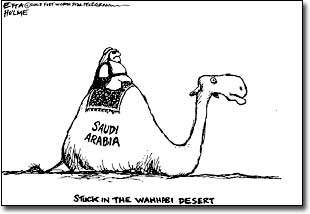Presidential candidate’s foreign policy questioned
By DONALD LAMBRO
WASHINGTON — Many of Howard Dean’s top foreign policy advisers are from the Brookings Institution, an ultra-liberal think tank that has served and staffed numerous Democratic administrations.
Some senior scholars there have doubts about Dean’s inexperience in foreign affairs, his positions on national security issues and the war against terrorism.
“His lack of commitment on Iraq, given where we now find ourselves, is unacceptable and also politically suicidal next year if he is the Democratic nominee,” says Michael E. O’Hanlon, Brookings’ senior fellow in foreign policy.
“At different times Dean has called for reduced funding in Iraq,” O’Hanlon told me. “Other times, he said our troops should be brought home and that Arab troops should be sent there. More recently, he said the world is no safer after Saddam’s capture. I think all these points are simply indefensible.”
The latest polls show that Dean is the clear front-runner in his party for the Democratic presidential nomination, but a Washington Post-ABC News survey finds that more than half of the Democrats polled know “hardly anything” or “nothing” about him or his views on the issues. What little is known about him among the general electorate, however, suggests that his biggest weakness is protecting national security, defined by his fierce opposition to the war in Iraq. When the Post-ABC News poll asked voters who they trusted more to handle the nation’s defense and the war on terrorism, President Bush or Dean, they chose Bush by 67 percent to Dean’s anemic 21 percent.
With good reason, according to O’Hanlon and others.
Dean recently said that he would abolish the administration’s anti-missile defense program, a critical national security component that has won overwhelming bipartisan support in Congress. Bill Clinton backed it during his presidency. At other times, Dean has told liberal defense groups that he would reduce funding, statements “that make him sound confused,” O’Hanlon said.
But it is the former Vermont governor’s recent remarks about how he would handle North Korea’s nuclear weapons threat that have triggered some of the sharpest opposition among Brookings’ top scholars.
In newspaper interviews prior to a major foreign policy address that he delivered earlier this month in Los Angeles, Dean said he would enter into immediate bilateral negotiations with Communist North Korea. He said he would offer them a major economic and energy assistance deal, plus a nonaggression treaty, in exchange for ending their nuclear weapons program.
This is essentially the same approach that Clinton followed early in his administration, only to see North Korea take the aid package as it secretly pursued its nuclear weapons buildup.
“It comes too close to buying the same horse,” O’Hanlon says. “We already gave North Korea incentives in 1994 to eliminate its nuclear weapons capabilities and then they violated that commitment.
“It would be seen at best as throwing money down a rat hole and, at worst, appeasing a Stalinist dictator.”
Richard Bush, another top foreign policy scholar at Brookings questions whether the United States should be offering generous handouts before getting concrete, verifiable assurances the North Koreans will end their nuclear program.
“We need to see a lot more reform in North Korea’s system before we consider large amounts of assistance,” says Bush. “What I’ve heard of his proposal suggests that there is a little bit too much generosity on the benefits.” Equally disturbing, he adds, is Dean’s pledge to immediately reward North Korea with bilateral talks.
“I align myself a little more with the diplomats in the administration who have no reason to trust North Korea but see the value of using multiparty talks to probe North Korea’s intentions,” he says.
As for opening the way for North Korea’s Communist regime, part of the president’s infamous “axis of evil,” to join the world community, Richard Bush says that such talk is, at best, very premature right now. “We should not leave the impression that they can be brought into the family of nations at no price to themselves,” he told me.
Even though doubts about Dean’s national security policies run deep, his feisty anti-war attacks on the president remain as popular as ever among liberal Democratic activists who turn out in disproportionate numbers in the party’s primaries. If he wins the nomination, as now seems likely, that sets up a wartime election not unlike 1972.
Just ask George McGovern about that one.
Copyright 2003, Newspaper Enterprise Assn.





